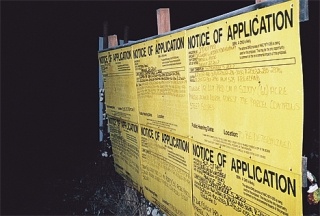Land use permit fees in Island County haven’t increased since 2001, but that’s an oversight the county commissioners may soon change.
At a staff meeting last week the commissioners reviewed fee increase recommendations from Jeff Tate, planning director, and philosophized about the intent of land use fees and who should pay.
Perusing the list of fee hikes, Commissioner Angie Homola asked, “Is it a big bite?” referring to cost increases.
“Overall, I think it’s a conservative increase,” Tate replied. “But there are some big bites.”
Helen Price Johnson offered that “costs should be directly in line with staff time,” a concept with which Tate voiced his agreement.
A few of the proposed planning permit fee increases:
• Short plat (four or fewer lots), from $500 plus $50 per lot to $1,000 plus $75 per lot.
• Long plat (five or more lots), from $2,160 plus $50 a lot to $2,500 plus $75 a lot.
• Variance, type 2 (requires posting a sign and newspaper publication), from $200 to $325.
• Variance, type 3 (requires public hearing), from $500 to $2,000.
• Open timber application, from $300 to $500.
• Zoning amendment application (rezone, type 3), from $500 to $2,000.
• Zoning code interpretation, from $150 to $300.
The issue of public appeals of decisions sparked discussion. For example, someone who appeals a Hearing Examiner decision must pay $100.
Commissioner John Dean agreed there should be some appeal fee, but he was wary of charging too much. He favored “a screen to stop frivolous complaints in appeals” but warned that “it’s a fine line … we don’t want to discourage people.”
Marianne Edain, representing the Whidbey Environmental Action Network, said WEAN “ends up paying those fees time and time again” when appealing decisions that WEAN considers harmful to the environment.
“When a developer wants a zoning code change he deserves to pay a fee, but an organization for the benefit of the community shouldn’t have to pay $800 every time,” she said, referring to the proposed comprehensive plan amendment fee.
On more complex projects, Homola suggested a flat fee for a certain number of staff hours, and then an hourly fee if staff work expands beyond the minimum. “We should be paid for our services,” she said, “but we shouldn’t be too harsh.”
Dean asked Tate if the new fees would cover the planning department’s costs. Tate replied that they may not cover each project’s cost, but overall “they cover the cost of much of the work done.”
It was the first airing of the proposed increases and Tate will come back with revisions in light of the commissioners’ comments.



